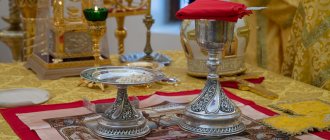Communion (or communion) is a church sacrament during which Christians partake of bread and wine, symbolically signifying the body of Christ. This sacrament was first established by the Savior himself at the Last Supper on the eve of his death on the cross. Before receiving communion, adults must go through confession.
Confession (otherwise called the sacrament of repentance) is another sacrament that involves sincerely telling the clergyman about the sins you have committed and receiving their forgiveness. Confessions can be conducted by priests or bishops.
How do you prepare for confession and communion? This question is often asked by believers. I suggest you find the answer to it in today's article.
Preparing for confession and communion: reminder
Preparing for confession and communion involves performing certain spiritual exercises by a Christian, who is assisted in this by a clergyman (or personal confessor). The purpose of preparation is to achieve a special spiritual and moral state necessary for carrying out the sacraments listed above.
The most basic thing that needs to be done is to read special prayers and sincerely repent of the sins committed. But preparation for the sacrament cannot be considered a one-time event, and after it go back to the old ways. If you have already come to God, then you must arrange your entire life according to Biblical principles.
It will not be enough to simply mechanically perform all the actions prescribed by the preparation: you should really want to become a spiritually developed person, be imbued with this idea and begin to implement it in practice.
Installation of the Sacrament
Everyone who has read the Gospel knows that on the eve of his death on the cross, Christ celebrated the Last Supper with his disciples. The plot has been depicted many times by different artists; this scene is present above the altar of any Orthodox church. That evening Jesus established a new bloodless sacrifice, replacing the sacrifices that existed among the Jews. That's why Easter is sometimes called New Testament Easter. There are significant differences, although the Jewish holiday is a prototype of the current Christian one.
- Instead of an innocent lamb, the Lamb of God was slain on the Cross. His blood redeemed Christians, who are the New Testament firstborn, by analogy with the Israelis.
- The passage through sea waters symbolizes Baptism, which frees Christians from subjection to sins.
- Walking in the desert is an analogy to earthly life, which is filled with suffering.
- The prototype of Communion was manna from heaven. Instead, Christ gave the apostles consecrated bread and wine.
The Jews prepared themselves to receive God's gifts by spending their lives following His direct instructions given through Moses. They also observed many rituals. Modern people need to prepare for Communion according to different rules. Communion is available only to members of the Church, that is, to those who were baptized in an Orthodox church. Baptism at home is only allowed if a person is dying. Sometimes a priest is called to the intensive care ward. Immediately after Baptism, Communion is served without preparation.
Preparation for Communion
Due to numerous requests from readers, we have prepared an “Orthodox Calendar” application for smartphones. Every morning you will receive information about the current day: holidays, fasts, days of remembrance, prayers, parables. Download for free: Orthodox Calendar 2022 (available on Android)
Are you ready for a radical change in your usual reality? Then you can begin to prepare for the sacred sacraments. Let's start with communion.
Prayers in church and at home
There are different versions of prayers: some of them are read in the temple, while others are at home. Before the sacrament of communion, it is important to increase the number of prayers said, pray with greater zeal, and also attend church services. Before communion, you must go to the evening service in the temple.
Among the prayers recommended for reading on the eve of Holy Communion are the following:
- “Following to Holy Communion” (prayer included in the Orthodox prayer book);
- canon of repentance to our Lord Jesus Christ;
- prayer canon to the Most Holy Theotokos;
- canon to the Guardian Angel;
- Akathist for Holy Communion.
True, it should be noted that reading the canons and akathist is not mandatory, but is carried out at the request of the believer and the availability of free time. You only need to read “Succession”.
Interesting! If you are preparing for communion during Bright Week, then the above canons are replaced by Easter.
Fast
Before communion it is necessary to fast. How long the fast will last, you should find out the exact number of days from the priest. The fact is that this number varies depending on the situation: whether a person is going to receive communion for the first time, whether he has adhered to Orthodox fasts before or not.
Usually you need to fast for 3 days. But sometimes confessors prescribe an additional 3 to 7 days of fasting on the eve of communion.
During fasting, animal products (meat, fish, eggs, dairy products) are not allowed to be consumed. Alcohol and tobacco are also strictly prohibited.
Fasting cannot be understood solely as food abstinence - you will have to temporarily give up going to places of entertainment, watching the same films and videos, and listening to secular music. A person must cleanse himself both physically and spiritually.
If we are talking about a married couple, then the day before, on the day of communion and the day after, you should refuse sexual relations.
From 00:00 on the day of communion, you should adhere to strict fasting - do not eat or drink. It is not allowed to have breakfast on the morning of the sacrament.
Important! In some cases, the priest makes restrictions for those people who, for health reasons, cannot withstand fasting and completely refuse food. They must be discussed in advance with the Holy Father.
Correct behavior
- Preparing for communion also involves reconciliation with everyone with whom you were in a state of quarrel.
- It is important to especially carefully control your thoughts, words and emotions: reduce manifestations of aggression, anger, irritation, do not judge other people (even in your thoughts), do not think about bad things, do not gossip.
- It is recommended to spend more time alone with yourself, reading the Bible or other spiritual publications.
Vaccination against death
In the Soviet years, it was believed that there was no “soul” in a person - there was only a body and some psychological processes in it, and if they were thoroughly studied, then scientific materialism would finally triumph. But the vast majority of the planet’s population is still far from such theories and knows very well that a person consists not only of a body, but also of a spirit and soul. So Christians believe that we exist only in the totality of these components - after all, it is impossible to call either a cold corpse or the soul of a deceased person who has lost his body a living person. Death, as is obvious to everyone, kills us, deprives us of integrity, and the tragedy of mortality frightens people all the more because deep down in our souls everyone has a living feeling - we were created to never die . After all, if death were inherent in our nature, thoughts about the upcoming departure would not burden us, and death would be the natural end of our life.
But even while a person lives, he is often separated from other people and from God by a mass of obstacles, based on a lack of love and a reluctance to communicate with the world. You can argue about whether it is possible to hide from death and hatred during life, you can simply close your eyes to the problem - but it is already useless to argue about what will happen to us after death: no one has returned from there. Christians believe that after death, a person’s condition will be determined by how he lived his earthly life - and reflecting on possible bliss after death, one of the wise said that one cannot enter heaven alone. In other words, if a person lives selfishly and at the same time hopes to learn what love for God and people is, then most likely he will not succeed.
Christians call salvation the overcoming of the gap between man and God, the return of man to the state for which he was conceived - to the eternal happiness that only love can give, or, as they also say, to eternal life. And since the Source of all life in the world is our Creator and no one else, a person can only be saved by communing with this Source, uniting with Him. This is what communion means - in this Sacrament a person is united with God. Without such a “vaccination” of life, humanity would have no chance of recovering from death. But how is this possible?
How does communion work?
It includes several stages:
- Removal of the Holy Gifts from the altar. Elderly people, children, the infirm and pregnant women are allowed forward; they all take turns approaching the Chalice. The sign of the cross is not made in front of the Holy Chalice, so as not to accidentally touch it.
- When it's your turn, fold your hands in the shape of a cross on your chest so that the right one covers the left one.
- You approach the Chalice, pronounce your name loudly and clearly in full, open your mouth and drink a spoonful of church wine (Cahors), eating it with a piece of bread that the priest will give you. Symbolically they mean the Blood and Body of Christ.
- Then you need to touch the edge of the Cup with your lips, go to the table, where you drink the prosphora, washing it down.
After receiving the Holy Gifts, believers do not go home until they kiss the altar cross kept by the clergyman. This is followed by the reading of prayers of thanks (although you can also read them yourself at home).
Important! On the day of communion, you need to behave as spiritually and decently as possible so that the church ritual does not go in vain (however, such behavior should become the norm of life).
What to do before confession
Holy Communion is preceded by confession, during which the believer cleanses his soul, repents of his sins, receiving forgiveness for them. How to properly prepare for confession?
- The day before, find peace in your soul: improve relationships with those with whom you quarreled, ask for forgiveness if you were to blame, or forgive your offenders yourself.
- Prepare a list of sins for confession by analyzing your behavior, your character traits, your actions that violated one or more of God’s Commandments. When you confess, do not be tempted to keep silent about anything: you must tell absolutely all your unseemly actions, passing the test of shame. Don't try to justify yourself in your own eyes or make other people guilty.
It is best if you confess in the evening before communion, and go to the Divine Liturgy in the morning.
Important point! If you are going to confess for the first time in your life or you have had a long break in church life, then come to church not on Sunday (then the church is usually crowded and the priest simply does not have enough time to listen to you in detail).
Be sure to tell the priest that this is your first confession. At worst, you can repent of your sins in the morning, before the church service. When the liturgy ends, but communion has not yet begun, a number of churches hold confession for children and sick people. But do not come to the temple when the service is already underway - this is extremely bad form.
Interesting! Children under the age of 7 can go to communion without confessing.
How to go through confession correctly
If you want to perform this sacrament “not for show,” but to really receive forgiveness, then be completely sincere with the priest, tell only the truth, do not embellish or invent anything.
Please also observe the following rules:
- Don't tell other people's sins.
- You cannot speak ambiguously in confession, or utter general words and phrases. Tell us specifically what you did wrong and sincerely repent of what you did.
- Do not name sins that have been confessed before unless you have repeated them again.
- It is unacceptable to hide the details of what is happening. By such actions you will desecrate the sacred sacrament, and instead of forgiveness you will earn even more sins.
At the end of confession, the clergyman reads a prayer for the forgiveness of sins over the repentant person. But this is done only when he has made a firm decision to stop leading a sinful life unlike God. Otherwise, the priest will not be able to forgive sins, then it is believed that there was no true repentance, and you simply told about your sins, but they remained with you.
10 commandments for preparing for confession
When preparing for the sacrament of confession, it is advisable for you to make a list of sins. This is necessary so that you do not get confused when you confess and do not lose sight of anything. And to help prepare it, rewrite











